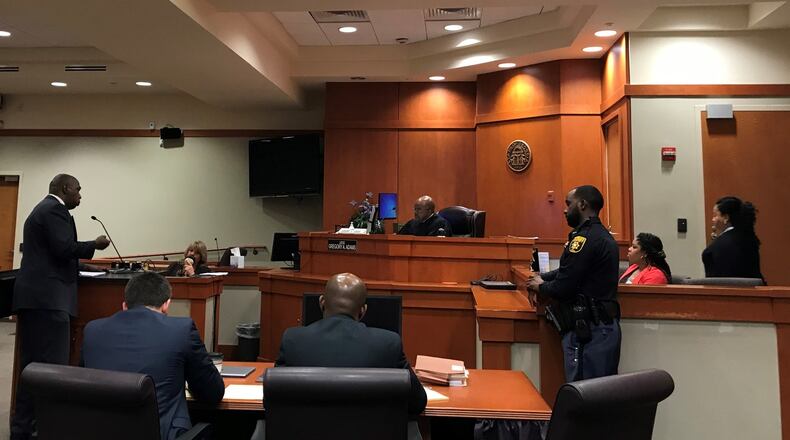Last February, when DeKalb County Commissioners voted themselves a massive pay raise without ever placing the issue on a written agenda, citizens expressed outrage and a sense of violation.
On Thursday, one resident fought back and had his day in court, arguing the roughly 60 percent pay hike commissioners adopted was illegal.
DeKalb resident Ed Williams accused the seven-member board of violating the state’s open meetings law, skirting local ordinance and other guidelines. The case seems to be one man’s long-shot attempt to put a check on his local leaders.
“What they have done is fraud and deception to the point of corruption,” Williams said. “And they should be ashamed of themselves.”
VIDEO: Previous coverage of this issue
DeKalb Superior Court Judge Gregory Adams heard testimony from Williams and county attorneys in the downtown Decatur courthouse. Williams asked the judge to invalidate the Feb. 27 vote that raised commissioners annual pay from $40,530 to $ 64,637, a pay hike that went just into effect on New Year’s Day.
None of the commissioners were present in the courtroom. Attorneys from the county’s law department argued that Williams has no standing and the case should be thrown out. Adams, who gave no indication which way he would rule, said he hoped to bring the case to a close soon.
Williams, 54, is an educator and a known activist in south DeKalb who ran unsuccessfully for a seat on the commission last fall. During the roughly one-hour hearing Thursday, he represented himself, calling commissioners' action an abuse of power.
“The evidence shows that the county has violated the charter, has violated open meeting laws, has violated the state constitution, and they should be held accountable for it,” he told the judge.
County attorneys said the pay increase was an official action of a governing body and therefore commissioners are shielded from lawsuits. They also questioned whether Williams had standing to file a lawsuit and argued that the raises were legal under state law.
They said Williams was trying to get the court to reverse a decision simply because he didn’t like what happened.
“He is upset that the commissioners got pay raises, and he does not believe that they deserve to have a pay raise,” Assistant County Attorney Bennett Bryan said. “And he does not believe they have the power to give themselves a pay raise.”
The commissioners’ action 11 months ago was controversial from the start. They voted to raise their pay even though the item was not listed on the meeting agenda and had not gone through the normal committee review process. The only notice was in an arcane and brief legal ad that ran in a weekly newspaper.
There was no debate or discussion, and Commissioner Nancy Jester was the only one to dissent. Commissioners, anticipating a possible backlash, argued immediately after the vote that the long hours serving on the board warranted higher compensation.
Afterward, reaction from citizens was swift. Williams and others filed a complaint to Georgia Attorney General Christopher Carr, who declared in June that the vote violated state open meeting laws. However, Carr said it was too late for him to undo what had happened.
He suggested the court system could hold commissioners accountable through civil or criminal actions.
After reviewing the matter, DeKalb Solicitor-General Donna Coleman-Stribling decided in November that there was not enough evidence to file charges. But she encouraged commissioners to redo the vote to address concerns about transparency. That never happened.
Williams continued to pursue the lawsuit he filed in August, setting up Thursday’s hearing.
Faye Coffield, a regular at commission meetings, was among a handful of DeKalb residents who came to the courthouse to support Williams. She said his presentation gave voice to citizens’ concerns.
“I think it showed that there is a problem,” she said. “If something isn’t done, all commissioners have to do is wait until a room is empty and all the public comment is closed and then do whatever they want.”
About the Author
Keep Reading
The Latest
Featured





